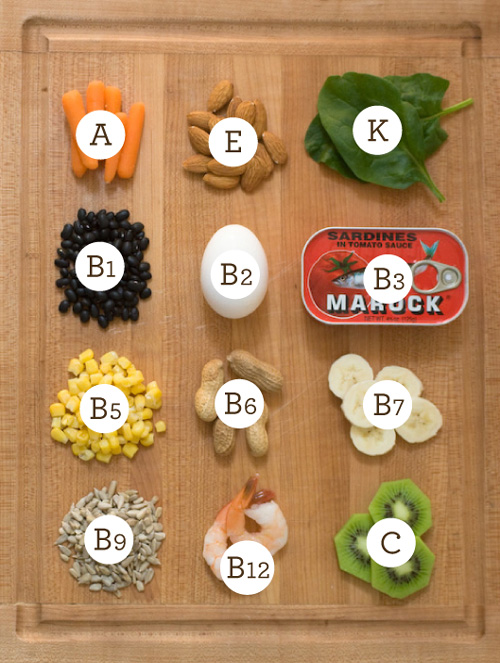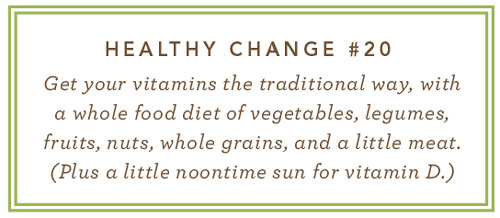
The quick answer: as illustrated above, whole foods are the best source of vitamins, but you have to think out of the box to get to that conclusion.
_____________________________________________________________________________________________
Thinking Out Of The Box
It’s a grim subject, but I had to smile at the ad that led with, “Think out of the box.” I’ll get back to the cause of my smile in a moment, but if you read this blog, you’re definitely an out-of-the-box thinker. In fact, over breakfast I was recounting a N. Y. Times article as the beautiful wife patiently listened. I was intrigued by the title: “A Mathematical Challenge to Obesity.”
An applied mathematician reported on his analysis of our national weight gain and type 2 diabetes problem. From 1975 to 2005 the average American gained 20 lbs. and weight-related diabetes soared. The math guy blames this on excess food supply.
Being an out of the box thinker, I advise the beautiful wife, “He’s got it wrong. It’s not about the amount of food—it’s about the nature of the food. We’re eating nutrient-depleted, mildly-addictive factory food rather than natural food. Natural food fills you up; factory food stimulates appetite."
The beautiful wife sighs, then smiles, but says nothing. I know what she’s thinking: Is it really possible all these high-paid experts are wrong and my very own husband—absent-minded, rumpled, and writing for free—has it right?
Raising six kids was a piece of cake; this is her real burden: She’s a believing person but has chosen to spend her life with a guy who questions everything. Take vitamin and supplement pills for example. Actually, don’t take them, unless prescribed by a doctor who has studied nutrition.
That’s my out-of-the-box position and the subject of this post. Which leads us back to the opening line and the ad that made me smile. The think out-of-the-box ad was promoting a service for the end result of what we've discussed so far . . . cremation.
Dust to Dust
If you took a chemistry class, it’s likely the periodic table of the elements was posted on the wall. The table was a clever idea. The earth is made up of just 92 natural elements and the table organizes them into 18 families. As a struggling student, I spent a lot of time staring at this chart. It came back to me the other day and I asked two questions: Does food contain all 92 elements? Do all the 92 elements have a role in our health? These are simple questions but the answer could be profound.
Take oxygen: It’s the most abundant element on earth as well as in our bodies—the average body has about 95 pounds in various forms. Gold, understandably is less common—you’ve got around .00002 lbs of gold inside your body. It’s as rare in the body as on earth, but is essential to joint health, transmission of electrical signals, and perhaps fertility. Male semen contains trace amounts of gold. Decorum demands I resist the impulse to make a joke. It’s hard.
Of the minerals, calcium and phosphorous are most abundant in the body. We hear a lot about eating too much sodium but more important is the balance of sodium to potassium in our food. Basically, factory food has too much sodium—because salt is the cheapest flavor—but natural food has a healthy ratio.
Think about the elements in vitamins: Vitamin B-12, aptly named cobalamine, contains cobalt, so this mineral has a critical health function. Vitamin B-12 is found only in animal products so this is a problem for vegans. Because the body contains a several-year reserve, deficiency is not immediate but it’s hard to diagnose so is a real threat to health.
Which brings me back to the original questions, asking whether food contains all 92 elements and whether all 92 are important to our health. Basically this is an incredibly complex question that Science, despite billions spent on research, has just begun to explore and will not answer in our lifetimes. It’s unknowable—but this doesn’t restrain your humble author.
Here’s an answer with a scriptural underpinning: My belief in the Creation story, symbolically presented in Genesis, tells me all 92 elements have a purpose and are all important to our health in the proportions delivered by Nature, as in whole foods.
Natural Vitamins
In last week’s post we advised eating orange fruits and vegetables daily and told how vitamin A is formed in the body from over 50 different carotenoids found in food. Though not yet proven, it’s possible that each of these carotenoids plays a needed function in the body. They may play multiple functions as the body processes them through the various stages. It’s complicated.
Still, knowing as little as we do, unless your doctor prescribes otherwise, the safest course is to get our vitamins from the natural ingredients, the pre-forms found in food, rather than from factory-made synthetic forms sold in pills. It’s that simple. Unless you have a unique medical condition, the best source of vitamins, and minerals, is to eat a variety of natural foods.
For more, check last year’s post on this subject: Best Source of Vitamins? Or read the N. Y. Times article, “The News Keeps Getting Worse for Vitamins.” In the next post we’ll take a different look, reviewing the essential micronutrients. Essential means you have to eat them; your body can’t produce the nutrient. Examples are the 13 vitamins, the 9 essential protein amino acids, and the omega-3 and omega-6 fats.

Need a reminder? Download our Healthy Change reminder card. Print and fold, then place in your kitchen or on your bathroom mirror to help you remember the Healthy Change of the week.